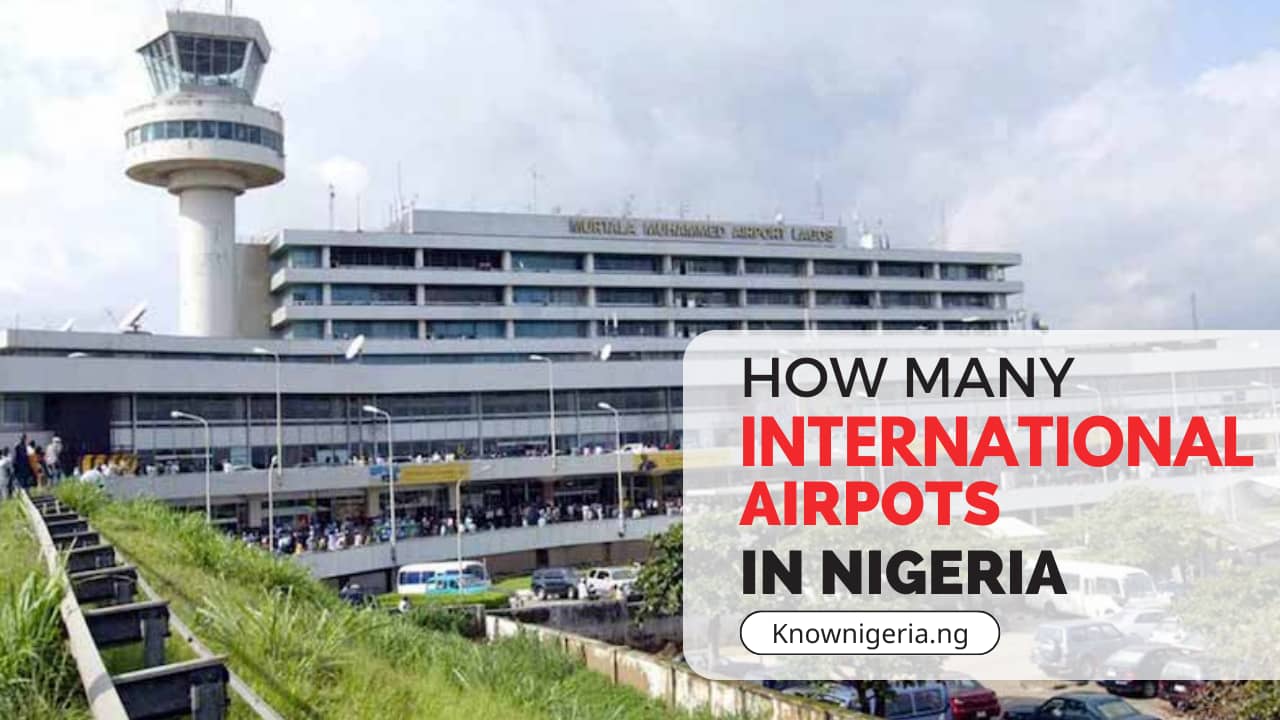There are 32 airports in Nigeria, a pretty disappointing number considering that Nigeria has 36 states, excluding the Federal Capital Territory. Of those 32 airports, only a measly five are international passenger airports that jet customers out of the country, while the cargo airport in Anambra is Nigeria’s sole international cargo airport.
While the number seems ridiculously small, we must admit that air travel is largely a pipe dream for most Nigerians, as it’s too expensive to fit into their budgets. However, if you’re one of the few Nigerians that can afford to fly out of the country for any reason, your airport options are limited to five.
In this article, we’ll explore the five international airports in Nigeria and how they compare.
Table of Contents
How Many International Airports are in Nigeria?
There are currently five international airports in Nigeria for passengers, but if you’re including the recently completed Anambra International ‘Cargo’ Airport, the number moves up to six. However, the reason why most lists don’t include the Anambra airport is apparent in its name: it’s a cargo airport!
While there’s nothing wrong with cargo airports, people typically don’t think of airplanes airlifting non-human goods when thinking about international flights. When the average Nigerian asks about recommendations for an international airport in Nigeria, they want one they can actually use, and there are only five.
The dearth of airports brings up another pertinent question: if there are 200 million individuals in Nigeria, why are there so few airports?
Also Read: 13 Famous Best Markets in Nigeria
Why there are Few International Airports in Nigeria
Nigeria’s airport situation is not very surprising for anyone with knowledge of the country’s transport dynamics. With Nigeria being a vast country, the most traveling most citizens ever do is to another Nigerian state; traveling outside the country isn’t very common, especially among low-income masses (that make up a significant portion of the population).
Also, Nigerians consider flights overly expensive for interstate travel, instead sticking to cheaper options like cars, buses, and trains. In short, most Nigerians don’t use airports, so it’s understandably counterintuitive for the government to populate the country with facilities nobody will use.
Rather than invest significant resources into building an international airport in Nigeria, it makes more sense to revolutionize the railway system, build excellent roads, and build an economy that makes flight tickets look cheap. Whether or not the government is focusing on that is a discussion for another day.
Before that day comes, however, let’s use this opportunity to look at the few international airports in Nigeria.
List of International Airports in Nigeria
1. Murtala Muhammed International Airport, Ikeja

Murtala Muhammed International Airport, unofficially known as Lagos Airport, Ikeja, is perhaps the most popular international airport in Nigeria, hosting some of Nigeria’s biggest airlines, including Arik Air, Air Peace, and Dana Air. It is the busiest airport for passenger traffic in Nigeria, making it the most reliable for international travel nationwide.
The airport has two terminals: a domestic terminal privately owned by Bi-Courtney Aviation Services and an international terminal owned and managed by the Nigerian government. While the former handles domestic flights to other airports in Nigeria, the latter deals in flights to other countries within and outside the African continent.
After a major renovation in 2013, the international terminal can now handle up to 1,000 passengers per hour. Despite the renovation, however, it remains infamous for substandard facilities and terrible food.
On the bright side, the terminal has restaurants and cafes, disabled-friendly facilities, premium lounges, and prayer rooms.
Popular destinations from the Murtala Muhammed Internal Airport include Abuja, Port Harcourt, Enugu, and Owerri for domestic flights and Amsterdam, Dubai, London, and Addis Ababa for international flights. Handling over 7.2 million flights in 2018, its place as the foremost international airport in Nigeria is beyond doubt.
2. Akanu Abiam International Airport, Enugu

The Akanu Abiam International Airport in Enugu is the primary exit point for travelers leaving Nigeria from the South East, as it’s the only international passenger airport in the region. Anambra International Cargo Airport is the only other international airport in the South East, but it’s primarily a cargo airport that doesn’t carry nearly as many passengers.
Being the administrative headquarters of the old Eastern region, it’s no surprise that Enugu state hosts the most important airport in the new South East zone. Akanu Abiam International Airport belongs to the Nigerian Federal Government, and it’s currently operated by the Federal Airports Authority of Nigeria.
The airport has always been amid controversy, the most recent being the 2019 shutdown after its relatively new runway collapsed. While the Federal Government has fixed and reopened the airport, it still struggles to compete with other international airports in Nigeria, and it’s not even the most preferred exit point for South Eastern travelers.
The last available flight data for the airport shows it handled 352,820 passengers in 2015, a low figure when compared side-by-side with that of the Port Harcourt International Airport, a direct competitor for outgoing and incoming traffic to the South Eastern part of the country.
Some airlines that operate at the airport include Air Peace, Ethiopian Airlines, Ibom Air, United Nigeria Airlines, and Green Africa Airways, and popular destinations include Lagos, Abuja, and Addis Ababa.
3. Port Harcourt International Airport, Port Harcourt

The Port Harcourt International Airport is located in Omagwa community, Ikwerre LGA in Rivers State, and it’s the busiest airport in the South-Southern part of Nigeria. Despite being in a South-Southern state, it’s a popular exit point for travelers leaving Nigeria from the South East and those heading back to the same destination.
The airport opened for airline traffic in the early 1980s, and quickly established itself as the third busiest airport in the country, just behind Murtala Muhammed International Airport and the Nnamdi Azikiwe International Airport in the FCT.
As expected, it doesn’t house as many airlines as its Abuja and Lagos counterparts, but it’s respectable. The airport hosts Air France, Air Peace, Aero Contractors, Qatar Airways, Arik Air, Turkish Airlines, and ValueJet, airlines that operate flights to destinations like Paris, Lagos, Abuja, Istanbul, Libreville, and Doha, among others.
Like most other Nigerian airports, the Port Harcourt International Airport has two terminals: one for domestic flights to destinations like Lagos and Abuja and the other for international flights. On 25 October 2018, the President Muhammadu Buhari-led Federal Government commissioned a new international terminal to tackle claims of the airport being the worst in the world.
There isn’t much credible data about how many passengers the airport services annually, but it’s expected to be around the 1.5 million mark, considering the last reported figure (2015) was 1,223,807. While the airport once had a notorious reputation, it’s now one of the best international airports in Nigeria.
4. Mallam Aminu Kano International Airport, Kano

Mallam Aminu Kano International Airport, Kano, is reputed for being the oldest domestic or international airport in Nigeria, opening for passenger traffic in 1936. The airport project materialized because of the pressing need for an airport to transport Nigerian pilgrims to Mecca in Saudi Arabia on the annual Islamic ritual pilgrimage.
Like most other international airports in Nigeria, Mallam Aminu Kano International Airport has two terminals: one for domestic flights and the other for international flights. It also has two runways, both in good condition. However, most flights use Runway #1, as Runway #2 is reserved for Military flights only.
The airport handles around 400,000 passengers annually, putting it well behind competitors in Abuja and Lagos. However, it also has a cargo compartment that delivers non-passenger goods to destinations like Cairo, Liege, and Jeddah in Saudi Arabia. The airliners that handle cargo flights at Mallam Aminu Kano International Airport include Saudi Cargo, Ethiopian Airlines Cargo, and EgyptAir.
On the flip side, the airport hosts several passenger airliners, from popular names like Azman Air, Arik Air, and Air Peace, to international airlines like Sudan Airways, Ethiopian Airlines, Qatar Airways, and EgyptAir.
While the airport sits in a controversial Nigerian region known for a high rate of insurgency, incidents at the airport are surprisingly few and far between, making it one of the safest in Nigeria for air travel.
5. Nnamdi Azikiwe International Airport, Abuja

As expected, Nigeria has a functional international airport in its capital city, the famous Nnamdi Azikiwe International Airport in Abuja. The airport has two terminals (domestic and international) and a runway, a typical configuration for the average international airport in Nigeria.
Its domestic terminal is pretty basic, featuring barebones facilities and a few services. The terminal opened in 2012, making it look dated, but it continues to hold up well, especially compared to other airport terminals in the country.
On the other hand, the international terminal at the Nnamdi Azikiwe International Airport is the largest in Africa, featuring 72 check-in counters and top-of-the-line facilities. Since it only opened in 2018, it still retains a modern look, especially compared to the relatively dated domestic terminal. According to the FAAN, the new airport terminal can handle up to 15 million passengers annually.
In 2021, the airport handled 5,323,905 passengers, which is only comparable to the country’s biggest airport, the Murtala Muhammed International Airport in Lagos. While the latter transported more passengers in the same year (5.6 million), the former is quickly becoming the hub for an increasing number of airlines, making it likely to overtake the Lagos airport in the future.
Speaking of airlines, the Abuja-based airport is home to many top airlines, including Air Peace, Air France, Azman Air, Ethiopian Airlines, Africa World Airlines, Ibom Air, and British Airways, among others. While most airlines at the airport ply international routes, Nnamdi Azikiwe International Airport remains a popular stop for domestic flights.
6. Anambra International Cargo Airport
The Anambra International Cargo Airport typically doesn’t make it into lists of the international airport in Nigeria, but it technically qualifies as one, as it handles flights outside the country. However, it mostly transports cargo, explaining why most Nigerians tend to discriminate against it as a valid international airport.
The airport was conceptualized in 2017 by then-Anambra state governor Willie Obiano, and it officially opened for business only three years later under the same administration. In the first month of operation, the airport recorded 142 flights, carrying 3,865 passengers in the process.
While it’s technically an international airport, it’s yet to start handling international flights to the scale of competing Nigerian airports like the Nnamdi Azikiwe International Airport in Abuja or the Murtala Muhammed International Airport in Lagos.
Which is the oldest airport in Nigeria?
The oldest airport in Nigeria is the Mallam Aminu Kano International Airport, as it started operations as far back as 1936. While it’s not nearly as important as it was several decades ago, it remains a crucial airport, as it’s one of the few international airports in Nigeria.
Which state in Nigeria has the best airport
The Murtala Muhammed International Airport in Lagos has been Nigeria’s busiest airport for years, and with modern renovations, it also doubles as the country’s best. With this fact in mind, the question of which state houses the best airport is no longer a discussion; it’s Lagos, for sure!
Conclusion
The number of international airports in Nigeria is ridiculously low, considering our insanely high population; only five currently work as they should. To be fair to us, international tourism is a luxury outside most Nigerians’ budgets, eliminating the need for too many international airports in Nigeria. In any case, here are your six (five) options if you’re looking to travel outside the country.
If you like the content we bring to you, we know you would love the awesome contents we put out on our Youtube channel, Tiktok, Facebook, Instagram, and Twitter. Please subscribe and follow us for more Premium Know Nigeria content.










